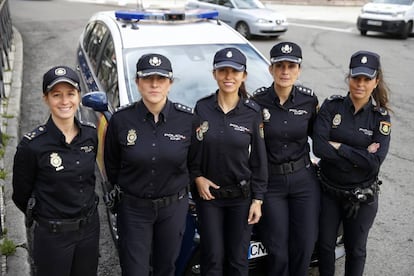From secretaries to secret police: Spain’s female officers celebrate 40 years on the force
Since 1979, the number of women in blue has jumped from 41 to more than 9,000, but as they explain, sexism remains an issue


María Ángeles Moreno remembers how she was once known as “female officer ‘Angelines’.” That was the title given to the first 42 women who became Spanish police officers 40 years ago. Today 9,068 women are officers, a figure that represent 14.8% of the entire police force, which is one of the best-rated institutions in Spain among the public.
One time they ‘confused’ me for a lawyer in court
Detective Blanca Ruíz
“We are no more than a reflection of society and by that same measure, we have moved forward but there is still a lot of work to do,” says María Dolores López Sánchez, who is the head of the police’s National Office for Gender Equality (ONIG), an organization that was created a year ago.
On February 1, 1979, 42 female officers, most with a university background, picked up their badge and service weapon and got ready to work: “We went as plainclothes officers, almost all of us were placed directly in operational posts. We were used for everything – in surveillance where we would be less obvious, to accompany or cover other officers. We were a pack of wild cards because they moved us according to the needs of one group or another. We didn’t stop,” explains Angelines, who is now 62 years old.
From secretaries to secret police
Up until that moment, women had only joined the police force as secretaries. That was a time when “women who were raped or abused were asked in the station if they had dressed too provocatively, if they were walking alone in the street, if they had enjoyed [the assault], or if they had worn a miniskirt,” explains Angelines.
Soon after, she and a few other pioneering female officers had to explain to many of their colleagues in the Ávila Police Academy “what questions cannot be asked under any circumstances and how to treat these women,” she says. This was the beginning of what is now called the Women and Family Unit (UFAM), and which is today part of almost every police precinct.
National Office for Gender Equality
This weekend marked one year since the creation of the National Office for Gender Equality, a kind of "observatory" that aims to ensure equality within the police force. "From seeing that language be inclusive [...] to resolving gender conflicts within the force, and improving conciliation and joint responsibility," explains María Dolores Sánchez, the head of the unit, who was promoted before her husband – also a police officer – and is the mother of three children.
In the past four decades, female officers have fought to become more visible and for posts with more responsibility – six police chiefs are women compared to 122 men and while there are 244 male police commissioners, just 24 are women.
Like other veterans, Angelines had to put up with a judge questioning her presence at a crime scene. “What are you doing here? This is very unpleasant,” came the comments. One detainee, meanwhile, asked: “This is a joke right?”
But while there have been some advances, more progress is needed. Blanca Ruíz, a detective in the Organized Crime Unit (UNYCO), recounts how “one time they ‘confused’ me for a lawyer in court. And I have been with prisoners who have asked me, ‘Where is the camera?’” But she believes there is increasingly less difference between male and female officers.
Women and police say it is a social challenge that has to do with “education and balanced family life,” says commissioner Carmen Muñoz. Dolores Sánchez agrees: “It’s not so much about what we find in the force but rather what each of us finds at home.”
English version by Melissa Kitson.
Tu suscripción se está usando en otro dispositivo
¿Quieres añadir otro usuario a tu suscripción?
Si continúas leyendo en este dispositivo, no se podrá leer en el otro.
FlechaTu suscripción se está usando en otro dispositivo y solo puedes acceder a EL PAÍS desde un dispositivo a la vez.
Si quieres compartir tu cuenta, cambia tu suscripción a la modalidad Premium, así podrás añadir otro usuario. Cada uno accederá con su propia cuenta de email, lo que os permitirá personalizar vuestra experiencia en EL PAÍS.
¿Tienes una suscripción de empresa? Accede aquí para contratar más cuentas.
En el caso de no saber quién está usando tu cuenta, te recomendamos cambiar tu contraseña aquí.
Si decides continuar compartiendo tu cuenta, este mensaje se mostrará en tu dispositivo y en el de la otra persona que está usando tu cuenta de forma indefinida, afectando a tu experiencia de lectura. Puedes consultar aquí los términos y condiciones de la suscripción digital.








































